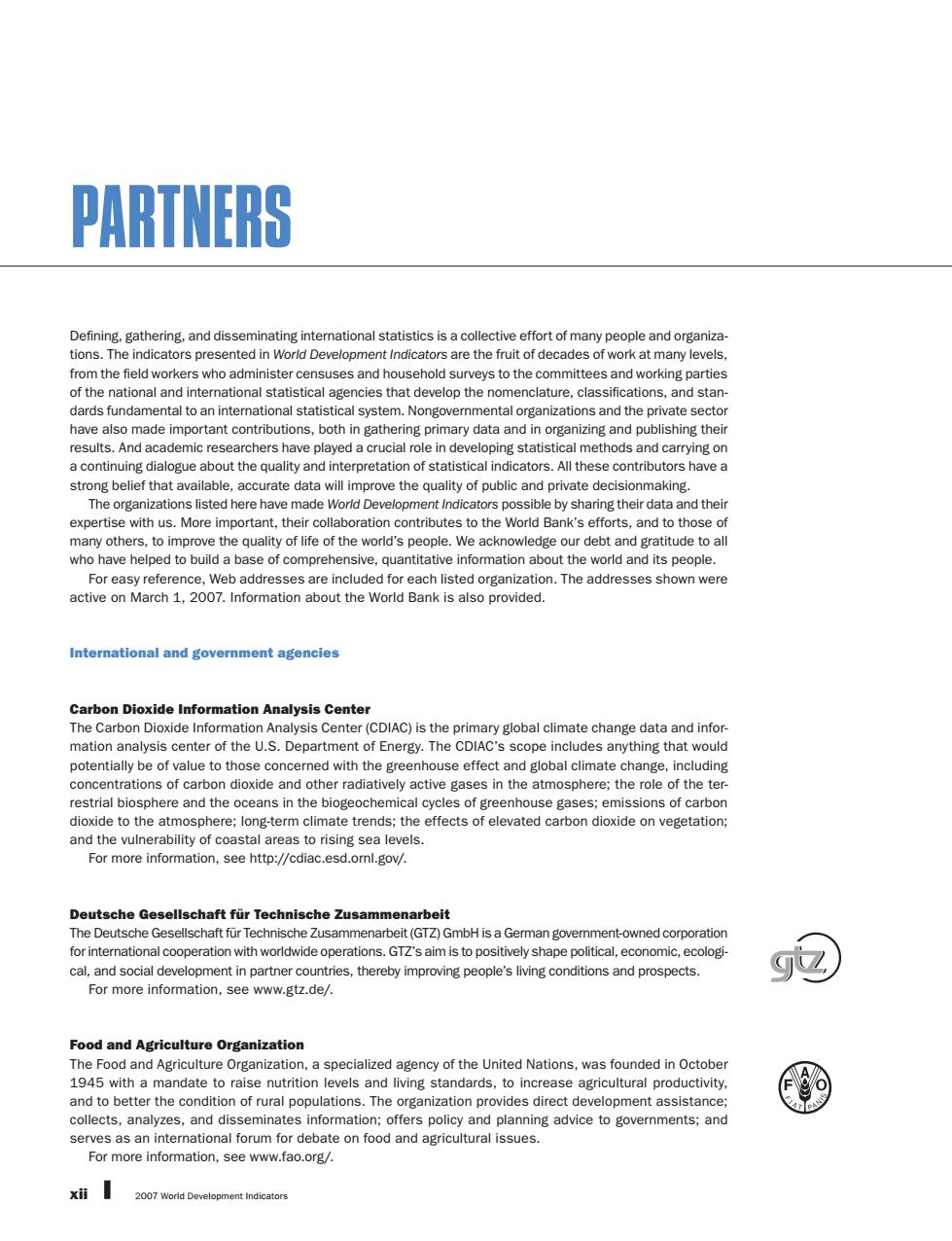正在加载图片...

PARTNERS Defining,gathering,and disseminating international statistics is a collective effort of many people and organiza- tions.The indicators presented in World Development Indicators are the fruit of decades of work at many levels, from the field workers who administer censuses and household surveys to the committees and working parties of the national and international statistical agencies that develop the nomenclature,classifications,and stan- dards fundamental to an international statistical system.Nongovernmental organizations and the private sector have also made important contributions,both in gathering primary data and in organizing and publishing their results.And academic researchers have played a crucial role in developing statistical methods and carrying on a continuing dialogue about the quality and interpretation of statistical indicators.All these contributors have a strong belief that available,accurate data will improve the quality of public and private decisionmaking. The organizations listed here have made World Development Indicators possible by sharing their data and their expertise with us.More important,their collaboration contributes to the World Bank's efforts,and to those of many others,to improve the quality of life of the world's people.We acknowledge our debt and gratitude to all who have helped to build a base of comprehensive,quantitative information about the world and its people. For easy reference,Web addresses are included for each listed organization.The addresses shown were active on March 1,2007.Information about the World Bank is also provided. International and government agencies Carbon Dioxide Information Analysis Center The Carbon Dioxide Information Analysis Center(CDIAC)is the primary global climate change data and infor- mation analysis center of the U.S.Department of Energy.The CDIAC's scope includes anything that would potentially be of value to those concerned with the greenhouse effect and global climate change,including concentrations of carbon dioxide and other radiatively active gases in the atmosphere;the role of the ter- restrial biosphere and the oceans in the biogeochemical cycles of greenhouse gases;emissions of carbon dioxide to the atmosphere;long-term climate trends;the effects of elevated carbon dioxide on vegetation; and the vulnerability of coastal areas to rising sea levels For more information,see http://cdiac.esd.ornl.gov/. Deutsche Gesellschaft fur Technische Zusammenarbeit The Deutsche Gesellschaft fur Technische Zusammenarbeit(GTZ)GmbH is a German goverment-owned corporation for international cooperation with worldwide operations.GTZ's aim is to positively shape political,economic,ecologi- cal,and social development in partner countries,thereby improving people's living conditions and prospects. For more information,see www.gtz.de/. Food and Agriculture Organization The Food and Agriculture Organization,a specialized agency of the United Nations,was founded in October 1945 with a mandate to raise nutrition levels and living standards,to increase agricultural productivity. and to better the condition of rural populations.The organization provides direct development assistance; T PA collects,analyzes,and disseminates information;offers policy and planning advice to governments;and serves as an international forum for debate on food and agricultural issues. For more information,see www.fao.org/. xii 2007 World Development Indicatorsxii 2007 World Development Indicators Defining, gathering, and disseminating international statistics is a collective effort of many people and organizations. The indicators presented in World Development Indicators are the fruit of decades of work at many levels, from the field workers who administer censuses and household surveys to the committees and working parties of the national and international statistical agencies that develop the nomenclature, classifications, and standards fundamental to an international statistical system. Nongovernmental organizations and the private sector have also made important contributions, both in gathering primary data and in organizing and publishing their results. And academic researchers have played a crucial role in developing statistical methods and carrying on a continuing dialogue about the quality and interpretation of statistical indicators. All these contributors have a strong belief that available, accurate data will improve the quality of public and private decisionmaking. The organizations listed here have made World Development Indicators possible by sharing their data and their expertise with us. More important, their collaboration contributes to the World Bank’s efforts, and to those of many others, to improve the quality of life of the world’s people. We acknowledge our debt and gratitude to all who have helped to build a base of comprehensive, quantitative information about the world and its people. For easy reference, Web addresses are included for each listed organization. The addresses shown were active on March 1, 2007. Information about the World Bank is also provided. International and government agencies Carbon Dioxide Information Analysis Center The Carbon Dioxide Information Analysis Center (CDIAC) is the primary global climate change data and information analysis center of the U.S. Department of Energy. The CDIAC’s scope includes anything that would potentially be of value to those concerned with the greenhouse effect and global climate change, including concentrations of carbon dioxide and other radiatively active gases in the atmosphere; the role of the terrestrial biosphere and the oceans in the biogeochemical cycles of greenhouse gases; emissions of carbon dioxide to the atmosphere; long-term climate trends; the effects of elevated carbon dioxide on vegetation; and the vulnerability of coastal areas to rising sea levels. For more information, see http://cdiac.esd.ornl.gov/. Deutsche Gesellschaft für Technische Zusammenarbeit The Deutsche Gesellschaft für Technische Zusammenarbeit (GTZ) GmbH is a German government-owned corporation for international cooperation with worldwide operations. GTZ’s aim is to positively shape political, economic, ecological, and social development in partner countries, thereby improving people’s living conditions and prospects. For more information, see www.gtz.de/. Food and Agriculture Organization The Food and Agriculture Organization, a specialized agency of the United Nations, was founded in October 1945 with a mandate to raise nutrition levels and living standards, to increase agricultural productivity, and to better the condition of rural populations. The organization provides direct development assistance; collects, analyzes, and disseminates information; offers policy and planning advice to governments; and serves as an international forum for debate on food and agricultural issues. For more information, see www.fao.org/. Partners WDI07 frontmatter.indd 12 3/25/07 12:17:56 PM